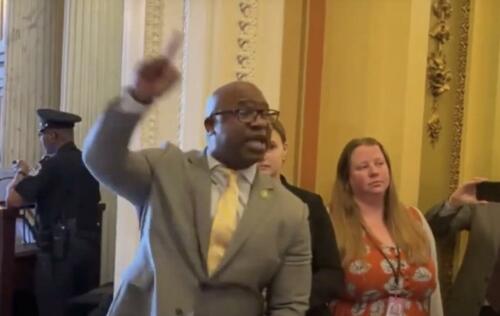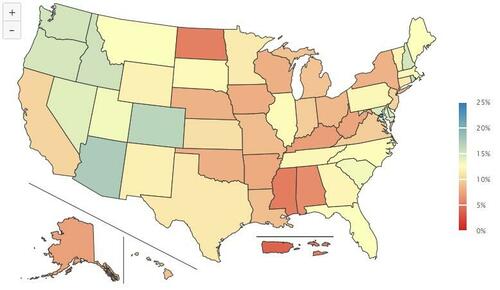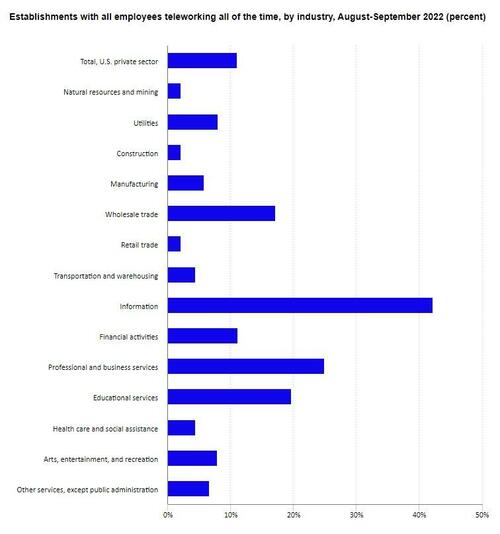Yellen Warns Next Crisis Could Come From ‘Shadow Banks’ And Regulators Must Act
Authored by Tom Ozimek via The Epoch Times (emphasis ours),
Treasury Secretary Janet Yellen on Thursday said banking rules may need to be tightened after the recent failures of Silicon Valley Bank (SVB) and Signature Bank, while warning of structural vulnerabilities that must be addressed in the “shadow bank” sector that includes things like hedge funds and money market funds.

In remarks prepared for delivery to the National Association for Business Economics (NABE), Yellen said that banking regulation and supervisory rules need to be reexamined in the wake of the twin collapses of SVB and Signature, which were sparked by bank runs.
“Anytime a bank fails, it is cause for serious concern. Regulatory requirements have been loosened in recent years. I believe it is appropriate to assess the impact of these deregulatory decisions and take any necessary actions in response,” Yellen said.
Yellen said a 2018 roll-back of bank capital requirements and stronger supervision for smaller and mid-size banks with assets below $250 billion should be reevaluated.
She added that regulatory reforms put in place after the 2008 financial crisis have helped the U.S. financial system cope with shocks, but that gaps remain and there’s scope to bolster resiliency.
“But the failures of two regional banks this month demonstrate that our business is unfinished,” Yellen said, adding that the U.S. financial system is now considerably more robust to shocks than it was during the previous crisis a dozen or so years ago.
“This is perhaps best illustrated by the fact that we’ve seen relative stability in the overall banking sector this month, even as concerns grew about specific institutions,” she said.
Smaller community and regional banks have seen a rise in deposit outflows following the failures of SVB and Signature while big banks seen as “too big to fail” and more likely to be bailed out have been the beneficiaries. This has led to concerns that as deposits flee local banks, their provision of credit will dwindle, with negative economic impacts, especially on small businesses.
Yellen said it was important for regulators to assess whether the current supervisory and regulatory regimes are adequate for the risks that banks face and, if not, then policymakers “must act.”
While she made no specific proposals for tighter regulatory and supervisory standards, she said any next steps must take into account the “health and competitiveness of our vibrant community and regional banking institutions,” which could face an outsized impact from more regulations.
She acknowledged that more regulation means bigger and costlier burdens on banks in general, but that such costs “pale in comparison to the tragic costs of financial crises.”
Shadow Banks in Crosshairs
In her speech, Yellen called for tighter regulation of the growing non-bank or “shadow bank” sector, which includes money market funds, hedge funds, and crypto assets.
In the traditional banking sector, there are rules and measures in place to reduce the risk of bank runs. Alongside capital and liquidity requirements for banks, there are also deposit guarantees provided by the Federal Deposit Insurance Corporation (FDIC), which all reduce the likelihood that depositors will rush to withdraw their savings at the first sign of trouble.
“Yet the financial stability risks posed by money market and open-end funds have not been sufficiently addressed,” Yellen cautioned.
Money market funds, in particular, are vulnerable to runs and fire sales, Yellen said, in part due to the so-called “first-mover advantage” that established an incentive for investors to redeem “at the whiff of a problem.”
The first-mover advantage in context of money market funds means that the first redeemers can exit the fund at $1 per share, while those who wait may be subject to a reduced market value and so take a haircut. This creates an incentive for investors to redeem at the first sign of a problem, which can lead to runs and panic sales that pose a risk to financial stability.
During the 2008 financial crisis, expected losses on Lehman Brothers commercial paper led to a run on the $62 billion Reserve Primary Fund, which in turn sparked concerns about commercial paper issued by other banks and led to runs on other money market funds.
The first-mover advantage was also at play in March 2020 amid the pandemic shock, when a record $255 billion flowed out of bond mutual funds, Yellen noted.
This and other structural vulnerabilities regarding money market and open-end funds aren’t new, and the Securities and Exchange Commission (SEC) has, over the past two years, sought to address them through new regulatory proposals.
In particular, the SEC’s proposals would reduce the first-mover advantage and also require new liquidity management tools and mandate that these funds provide investors and the SEC with more comprehensive and timely information.
‘Negative Spiral of Margin Calls’
Hedge funds, meanwhile, which had nearly $10 trillion in gross assets in 2021, face leverage risks, Yellen said.
“Leverage can support economic growth, but excessive leverage is dangerous. It can add fuel to fire sales by triggering a negative spiral of margin calls and rapid asset liquidations,” she said. These fire sales can transmit stress to other market participants, including large, systemically important banks.
“Post-crisis banking regulations have helped reduce the potential of spillovers to the banking system. But spillovers from these fire sales to other market participants remain a risk,” Yellen said.
Yellen said that, in an effort to address these risks, the multi-regulator Financial Stability Oversight Council’s restored Hedge Fund Working Group will continue to monitor them and develop policy recommendations.
Also on the Treasury secretary’s radar for systemic vulnerabilities that could seed a financial crisis are digital assets. Of particular concern are stablecoins, which could also be forced into asset fire sales in times of stress.
“A run on one stablecoin can lead to panicked runs on other stablecoins—causing even broader selloffs,” Yellen said, adding that Congress should pass legislation to establish a comprehensive prudential regulatory framework for stablecoin issuers and for other digital assets.
Yellen said the Biden administration is studying the potential for systemic risks from digital assets.
“And we are also exploring broader policy issues around the future of money and payments, including the possibility of a central bank digital currency,” Yellen said.
Meanwhile, global banking regulators have been discussing stepping up scrutiny of how risks from systemically important shadow banks could destabilize lenders.
Pablo Hernández de Cos, chair of the global Basel Committee, which writes bank capital rules that are applied across the world, said in a speech last week that additional guidance for managing shadow bank risks should be rolled out sometime this year.
Tyler Durden
Fri, 03/31/2023 – 15:47
via ZeroHedge News https://ift.tt/TdckR7S Tyler Durden










